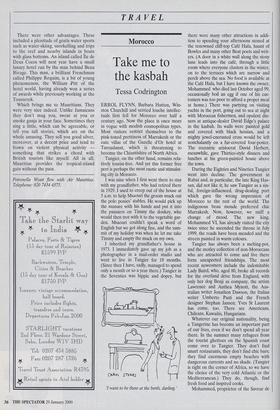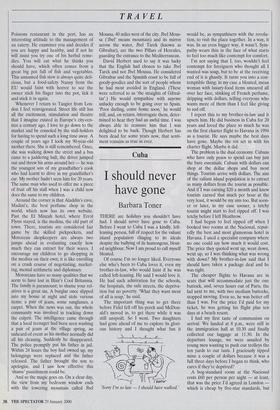Morocco
Take me to the kasbah
Tessa Codrington
ERROL FLYNN, Barbara Hutton, Win- ston Churchill and serried louche intellec- tuals first fell for Morocco over half a century ago. Now the place is once more in vogue with modish cosmopolitan types. Most visitors restrict themselves to the pink-toned prettiness of Marrakesh or the cute villas of the Gazelle d'Or hotel at Taroudannt, which is threatening to become the Chiantishire of North Africa.
Tangier, on the other hand, remains rela- tively tourist-free. And yet this former free port is perhaps the most exotic and stimulat- ing city in Morocco.
I was nine when I first went there to stay with my grandfather, who had retired there in 1929. I used to creep out of the house at 5 a.m. to help Msaouri the groom muck out the polo ponies' stables. He would pick up the manure with his hands and put it into the panniers on Timmy the donkey, who would then trot with it to the vegetable gar- den. Msaouri couldn't speak a word of English but we got along fine, and the sum- mit of my holiday was when he let me take Timmy and empty the muck on my own.
I inherited my grandfather's house in 1973. I immediately gave up my job as a photographer in a mail-order studio and went to live in Tangier for 18 months. (Since then I have, sadly, managed to spend only a month or so a year there.) Tangier in the Seventies was hippie and dopey, but 'I want to be there at the berth, darling.' there were many other attractions in addi- tion to spending your afternoons stoned at the renowned cliff-top Café Hafa, haunt of Bowles and many other Beat poets and writ- ers. (A door in a white wall along the stony lane leads into the café, through a little room where everyone clusters in the winter, on to the terraces which are narrow and perch above the sea. No food is available at the Café Hafa, but I have known the owner, Mohammed who died last October aged 99, occasionally boil an egg if one of his cus- tomers was too poor to afford a proper meal at home.) There was partying on visiting yachts in the port, going out to sea at night with Moroccan fishermen, and opulent din- ners at antique-dealer David Edge's palace in the kasbah. Its walls were painted gold and covered with black hessian, and a mighty jewel-encrusted cross would be left nonchalantly on a fur-covered four-poster. The eccentric aristocrat David Herbert, meanwhile, gave Thirties-style dinners and lunches at his green-painted house above the town.
During the Eighties and Nineties Tangier went into decline. The government in Rabat and, in particular, the late King Has- san, did not like it; he saw Tangier as a sin- ful, foreign-influenced, drug-dealing port which gave the wrong impression of Morocco to the rest of the world. The indigenous beau monde preferred chic Marrakesh. Now, however, we sniff a change of mood. The new king, Mohammed VI, has already visited the city twice since he ascended the throne in July 1999, the roads have been mended and the streets painted in warm colours.
Tangier has always been a melting-pot, and the motley collection of non-Moroccans who are attracted to come and live there form unexpected friendships. The most recent newcomers include the indomitable Lady Baird, who, aged 80, broke all records for the overland drive from England, with only her dog Benji as company, the artists Lawrence and Anthea Mynott, the Aus- tralian writer Jonathon Dawson, the Italian writer Umberto Pasti and the French designer Stephan Jansen; Yves St Laurent has come, too. There are Americans, Chileans, Kuwaitis, Hungarians.
Whatever our original nationality, being a Tangerine has become an important part of our lives, even if we don't spend all year there. In the summer many refugees from the tourist ghettoes on the Spanish coast come over to Tangier. They don't find smart restaurants, they don't find chic bars; they find enormous empty beaches with dangerous currents and no shade. (Tangier is right on the corner of Africa, so we have the choice of the very cold Atlantic or the Mediterranean.) They do, though, find fresh food and inspired cooks.
Mohammed, proprietor of the Saveur de Poissons restaurant in the port, has an interesting attitude to the management of an eatery. He examines you and decides if you are happy and healthy, and if not he will insist you try one of his herbal reme- dies. You will eat what he thinks you should have, which often comes from a great big pot full of fish and vegetables. This unnamed fish stew is always quite deli- cious, but a food-safety Nanny from the EU would faint with horror to see the owner stick his finger into the pot, lick it and stick it in again.
Whenever I return to Tangier from Lon- don I feel reinvigorated. Street life still has all the excitement, stimulation and theatre that I imagine existed in Europe's city-cen- tres a century ago. I love to go down to the market and be consoled by the stall-holders for having to spend such a long time away. A couple of years ago I took my 90-year-old mother there. She is still remembered. Once, she was walking down the street and a bus came to a juddering halt, the driver jumped out and threw his arms around her — he was the youngest son of my grandfather's cook who had learnt to drive in my grandfather's car. My mother hadn't seen him for 20 years. The same man who used to offer me a piece of fruit off his stall when I was a child now does the same to my children.
Around the corner is that Aladdin's cave, Madini's, the best perfume shop in the world, which now has its own website. Past the El Minzah hotel, where Errol Flynn stayed, is the medina, the old part of town. There, tourists are considered fair game by the skilled pickpockets, and Moroccan shopkeepers are always two jumps ahead in evaluating exactly how much they can extract for their wares. I encourage my children to go shopping in the medina on their own; it is like enrolling on a crash course of negotiating, market- ing, mental arithmetic and diplomacy.
Moroccans have so many qualities that we seem to have lost in Blair's Cool Britannia. The family is paramount; to shame your rel- atives is a great sin. A burglar once slipped into my, house at night and stole various items: a pair of jeans, some sunglasses, a carpet. When the news was out, the whole community was involved in tracking down the culprit. The intelligence came through that a local teenager had been seen washing a pair of jeans at the village spring, an unheard-of event as his mother normally did all his cleaning. Suddenly he disappeared. The police promptly put his father in jail. Within 24 hours the boy had owned up, my belongings were replaced and the father released. The father brought the son to apologise, and I saw how effective this 'shame' punishment could be.
And so the magic goes on. On a clear day, the view from my bedroom window ends with the towering mountain called Jbel Moussa, 40 miles west of the city. Jbel Mous- sa ('Jbel' means mountain) and its mirror across the water, Jbel Tarek (known as Gibraltar), are the two Pillars of Hercules, guarding the entrance to the Mediterranean.
David Herbert used to say it was lucky that the English had chosen to take Jbel Tarek and not Jbel Moussa. He considered Gibraltar and the Spanish coast to be full of goody-goodies and the sort of people whom he had most avoided in England. (These were referred to as 'the straights of Gibral- tar') He would sympathise with anyone unlucky enough to be going over to Spain. 'Poor darling, come home soon,' he would trill, and, on return, interrogate them, deter- mined to hear they had an awful time. I was always able to reassure him that I was delighted to be back. Though Herbert has been dead for some years now, that senti- ment remains as true as ever.



















































































 Previous page
Previous page